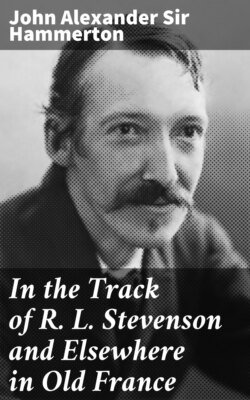Читать книгу In the Track of R. L. Stevenson and Elsewhere in Old France - John Alexander Sir Hammerton - Страница 8
V.
ОглавлениеIt was late in the afternoon when we continued our journey from Goudet, intent on reaching that evening the lake of Bouchet, which Stevenson had selected as the camping-place for the first night of his travels. The highway to Ussel is one of the most beautiful on the whole route, lying through a wide and deep glen, similar to many that exist in the Scottish Highlands, but again unlike all the latter in its numerous terraces, that bear eloquent witness to the industry of the country-folk. Every glen in this region of France is remarkable for this handiwork of the toilers, and the time was, before the advent of the sporting nawbobs, when in some parts of the Scottish Highlands similar rude stonework was common in the glens.
CHÂTEAU BEAUFORT AT GOUDET
SPIRE OF OUR LADY OF PRADELLES
To those who have not seen this work of the poor hill-folk it is not easy to convey a proper idea of its effect on the landscape. In these bleak mountain regions the sheltered valleys and ravines are best suited for growing the produce of the field, but as the soil is scant and the ground too often takes the shape of a very attenuated V, it is impossible to cultivate the slopes of the valley in their natural condition; so, with infinite labour and the patience of their stolid oxen, the Cevennols begin by building near the banks of the stream a loose stone wall, and filling in the space between that and the upward slope with a level bedding of earth. Thus step by step the hillside is brought into cultivation, and the terraces will be found wherever it is possible to rear a wall and carry up soil; indeed, they are to be seen in many places where it would have been thought impossible to prepare them, and out of reason to grow crops upon them. Often they are not so large as an ordinary bedroom in area, and such a space one may see under wheat. A hillside so terraced looks like a flight of giant steps, and it is a unique spectacle to children of the plains to descry, perhaps on the twentieth story, so to say, a team of oxen ploughing one of these eerie fields.
Along this road, where on our right the terraces climbed upward to the naked basalt, and on the other side of the valley, now flooded with a pale yellow sunset that picked out vividly children at play tending a scanty herd of cattle on the hillside, our donkey driver of old had some of his bitterest experiences with that thrawn jade Modestine. We, fortunate in our more docile mounts, made excellent progress to Ussel, after walking a good two miles on foot. The road beyond that town was lively with bullock wagons, heavily freighted with timber, and carts, mostly drawn by oxen, filled with women returning from the market at Costaros, a little town on the highway between Le Puy and Pradelles; bullocks and people—the former to our embarrassment—being greatly interested in the wheel-travellers of these seldom cycled roads.
When we arrived at Costaros, a town that is drab and dismal beyond words, the evening was wearing out under a leaden sky, promising the stragglers from the market good use for their bulky umbrellas, and we had still eight kilometres of rough country roads between us and the lake. Stevenson, in his heart-breaking struggles with the wayward ass, must have crossed the highway in the dark some little distance south of Costaros to have arrived at the village of Bouchet St. Nicolas, two miles beyond the lake; and as we urged forward in the rain, which now fell pitilessly and turned the darkling mountains into phantom masses smoking with mist, we could appreciate to the full the satisfaction with which he abandoned his quest of the lake and spent his first night snug at the inn of Bouchet. As we wheeled through the mud into the large village of Cayres no straggler appeared in the streets, that steamed like the back of a perspiring horse; but a carpenter at work in a windy shed assured us that the chalet on the shore of the lake had opened for the season, and in our dripping state we pressed thither uphill, feeling that two miles more in the rain could not worsen our condition. It was a weird and moving experience—the ghostly woods on the hillside, the tuneless tinkle of bells on unseen sheep, the hissing noise of our wheels on the moist earth—and our delight was great when we heard the lapse of water on our left. For nearly a mile the latter part of the road lay through a pine forest, where the ground had scarcely suffered from the rain, but the way was dark as in a tunnel, and glimpses of the lake between the trees showed the water almost vivid as steel by contrast.
